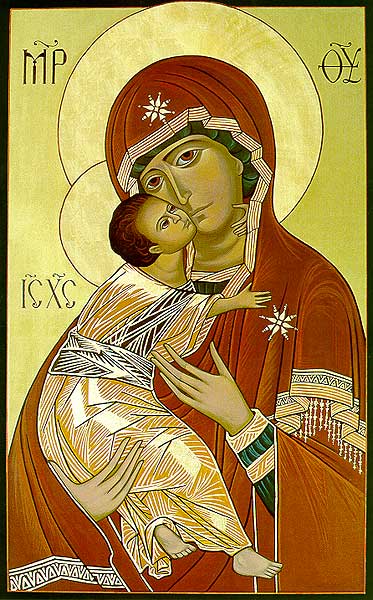Some years ago when I was a doctoral student at Cornell University in upstate New York, needing a break I drove several hours to visit the Russian Orthodox monastery of the Holy Trinity in Jordanville, NY. I had begun to develop a deep appreciation for Russian spirituality ever since reading Russian Mystics by Sergius Bolshakoff, with its marvelous preface by Thomas Merton. I enjoyed the beauty of the church and grounds, and then spent time in their large shop.

Holy Trinity Monastery in Jordanville, NY
Among the books and icons was a little pamphlet with a photo of a lovely icon of the Virgin and Child. In it was the text of the great prayer known as the Akathist to Our Most Holy Lady, Mary the Mother of God. An “akathist” refers to any prayer recited or sung standing, but this particular one is the most famous of all in the Byzantine tradition. I began to use it myself in private devotion. In exuberant and rich phraseology, it guides the worshipper through the story from the Annunciation through the familiar events of the Infancy Narratives, presenting in its way an incomparable theological reflection on the meaning of these events. Each section of the hymn, known as a Kontakion and Oikos, contain endless food for devotion, as in this example:
Kontakion 12
When the Absolver of all mankind desired to blot out ancient debts, of His Own will He came to dwell among those who had fallen from His Grace; and having torn up the handwriting of their sins, He heareth this from all: Alleluia!
Oikos 12
While singing to thine Offspring, we all praise thee as a living temple, O Theotokos; for the Lord Who holdeth all things in His hand dwelt in thy womb, and He sanctified and glorified thee, and taught all to cry to thee:
| Rejoice, tabernacle of God the Word: Rejoice, saint greater than the saints! Rejoice, ark gilded by the Spirit: Rejoice, inexhaustible treasury of life! Rejoice, precious diadem of pious kings: Rejoice, venerable boast of reverent priests! Rejoice, unshakable fortress of the Church: Rejoice, inviolable wall of the kingdom! Rejoice, thou through whom victories are obtained: Rejoice, thou through whom foes fall prostrate! Rejoice, healing of my flesh: Rejoice, salvation of my soul! Rejoice, O Bride Unwedded! |
Rejoice, |
Despite what retailers might say, this feast of the Nativity is the beginning of the Christmas season, not the end! Might I suggest that one way to keep this season of Christmastide is to pray this great hymn every day, or parts of it each day? Like the beloved Litany of Loreto, more familiar to Catholics in the western tradition, it provides profound and endless depths for prayerful reflection. But if this ancient hymn is new to you, let me suggest on this Christmas morn it can provide fresh perspectives on stories that can grow in some ways too familiar. It can guide us through ancient but joyful pathways to new appreciation of how the splendid variety of the Christian tradition can renew the hearts at Christmas and help us approach the Mysteries with a childlike wonder.



